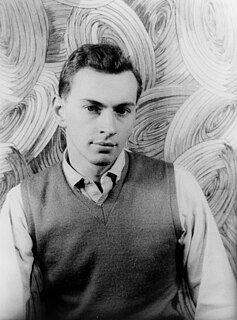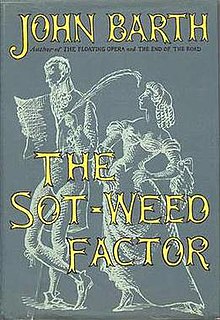Related Research Articles

John Hoyer Updike was an American novelist, poet, short-story writer, art critic, and literary critic. One of only four writers to win the Pulitzer Prize for Fiction more than once, Updike published more than twenty novels, more than a dozen short-story collections, as well as poetry, art and literary criticism and children's books during his career.

Eugene Luther Gore Vidal was an American writer and public intellectual known for his epigrammatic wit, erudition, and patrician manner. Vidal was bisexual, and in his novels and essays interrogated the social and cultural sexual norms he perceived as driving American life. Beyond literature, Vidal was heavily involved in politics. He twice sought office—unsuccessfully—as a Democratic Party candidate, first in 1960 to the U.S. House of Representatives, and later in 1982 to the U.S. Senate.

A pastiche is a work of visual art, literature, theatre, music, or architecture that imitates the style or character of the work of one or more other artists. Unlike parody, pastiche celebrates the work it imitates, rather than mocking it.
Metafiction is a form of fiction which emphasises its own constructedness in a way that continually reminds the audience to be aware they are reading or viewing a fictional work. Metafiction is self-conscious about language, literary form, and story-telling, and works of metafiction directly or indirectly draw attention to their status as artifacts. Metafiction is frequently used as a form of parody or a tool to undermine literary conventions and explore the relationship between literature and reality, life, and art.

John Simmons Barth is an American writer who is best known for his postmodern and metafictional fiction. His most highly regarded and influential works were published in the 1960s, and include The Sot-Weed Factor, a satirical retelling of Maryland's colonial history, and Lost in the Funhouse, a self-referential and experimental collection of short stories. Though Barth's work has been controversial among critics and readers, he received the National Book Award in 1973 for his novel Chimera. Despite Barth's influence on postmodern literature in America, his influence and publicity have decreased since his novels were published.

John Champlin Gardner Jr. was an American novelist, essayist, literary critic and university professor. He is best known for his 1971 novel Grendel, a retelling of the Beowulf myth from the monster's point of view.
Postmodern literature is a form of literature that is characterized by the use of metafiction, unreliable narration, self-reflexivity, intertextuality, and which often thematizes both historical and political issues. This style of experimental literature emerged strongly in the United States in the 1960s through the writings of authors such as Kurt Vonnegut, Thomas Pynchon, William Gaddis, Philip K. Dick, Kathy Acker, and John Barth. Postmodernists often challenge authorities, which has been seen as a symptom of the fact that this style of literature first emerged in the context of political tendencies in the 1960s. This inspiration is, among other things, seen through how postmodern literature is highly self-reflexive about the political issues it speaks to.

Giles Goat-Boy (1966) is the fourth novel by American writer John Barth. It is metafictional comic novel in which the universe is portrayed as a university campus in an elaborate allegory of both the hero's journey and the Cold War. Its title character is a human boy raised as a goat, who comes to believe he is the Grand Tutor, the predicted Messiah. The book was a surprise bestseller for the previously obscure Barth, and in the 1960s had a cult status. It marks Barth's leap into American postmodern fabulism.
Joseph Prince McElroy is an American novelist, short story writer, and essayist. He is noted for his long postmodern novels such as Women and Men.

Lost in the Funhouse (1968) is a short story collection by American author John Barth. The postmodern stories are extremely self-conscious and self-reflexive and are considered to exemplify metafiction.

The End of the Road is the second novel by American writer John Barth, published first in 1958, and then in a revised edition in 1967. The irony-laden black comedy's protagonist Jacob Horner suffers from a nihilistic paralysis he calls "cosmopsis"—an inability to choose a course of action from all possibilities. As part of a schedule of unorthodox therapies, Horner's nameless Doctor has him take a teaching job at a local teachers' college. There Horner befriends the super-rational Joe Morgan and his wife Rennie. The trio become entangled in a love triangle, with tragic results. The story deals with issues controversial at the time, such as sexuality, racial segregation, and abortion.

Jay Parini is an American writer and academic. He is known for novels, poetry, biography, screenplays and criticism. He has published novels about Leo Tolstoy, Walter Benjamin, Paul the Apostle, and Herman Melville.

James Otis Purdy was an American novelist, short-story writer, poet, and playwright who, from his debut in 1956, published over a dozen novels, and many collections of poetry, short stories, and plays. His work has been translated into more than 30 languages and in 2013 his short stories were collected in The Complete Short Stories of James Purdy.

The Sot-Weed Factor is a 1960 novel by the American writer John Barth. The novel marks the beginning of Barth's literary postmodernism. The Sot-Weed Factor takes its title from the poem The Sot-Weed Factor: Or, a Voyage to Maryland. A Satyr (1708) by the English-born poet Ebenezer Cooke, about whom few biographical details are known.
Post-postmodernism is a wide-ranging set of developments in critical theory, philosophy, architecture, art, literature, and culture which are emerging from and reacting to postmodernism. One other similar recent term is metamodernism.

Experimental literature is a genre that is, according to Warren Motte in his essay "Experimental Writing, Experimental Reading", "difficult to define with any sort of precision." He says the "writing is often invoked in an "offhand manner" and the focus is on "form rather than content." It can be in written form of prose narrative or poetry, but the text may be set on the page in differing configurations than that of normal prose paragraphs or in the classical stanza form of verse. It may also be entwined with images of a real or abstract nature, with the use of art or photography. Furthermore, while experimental literature was traditionally handwritten on paper or vellum, the digital age has seen an exponential leaning to the use of digital computer technologies.

Live from Golgotha: The Gospel according to Gore Vidal is a novel by Gore Vidal, an irreverent spoof of the New Testament. Told from the perspective of Saint Timothy as he travels with Saint Paul, the 1992 novel's narrative shifts in time as Timothy and Paul combat a mysterious hacker from the future who is deleting all traces of Christianity.
The death of the novel is the common name for the theoretical discussion of the declining importance of the novel as literary form. Many 20th century authors entered into the debate, often sharing their ideas in their own fiction and non-fiction writings.
A novelist is an author or writer of novels, though often novelists also write in other genres of both fiction and non-fiction. Some novelists are professional novelists, thus make a living writing novels and other fiction, while others aspire to support themselves in this way or write as an avocation. Most novelists struggle to have their debut novel published, but once published they often continue to be published, although very few become literary celebrities, thus gaining prestige or a considerable income from their work.
New historicism, a form of literary theory which aims to understand intellectual history through literature and literature through its cultural context, follows the 1950s field of history of ideas and refers to itself as a form of cultural poetics. It first developed in the 1980s, primarily through the work of the critic Stephen Greenblatt, and gained widespread influence in the 1990s. Greenblatt coined the term new historicism when he "collected a bunch of essays and then, out of a kind of desperation to get the introduction done, he wrote that the essays represented something called a 'new historicism'".
References
- ↑ in Contemporary Literature, 2000
- ↑ "The Literature of Exhaustion". Elab.eserver.org. Archived from the original on 2012-05-21. Retrieved 2012-05-25.
- ↑ Jacques Jout and the Literature of Exhaustion on JSTOR
- ↑ Vidal, Gore (June 15, 1976). "American Plastic: The Matter of Fiction". New York Review of Books. Retrieved 29 November 2014.
- ↑ I. Some general ideas of postmodernism